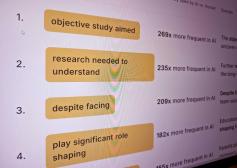Fonts matter, claims new educational consortium at U. Central Florida

The University of Central Florida on Tuesday announced it’s developing technology so readers can personalize digital materials to make them easier to read and comprehend.
UCF, Google, Adobe and Readability Matters, a nonprofit group that focuses on accessibility through digital formatting, on Tuesday announced the “Readability Consortium,” a network of more than 50 researchers to further research on the link between personalized formatting and readability, as well as to create digital tools that can apply preferences across digital texts. Font and spacing can affect how quickly people read, to the extent that the right formatting can act as digital “reading glasses,” UCF assistant professor Ben Sawyer told EdScoop.
“I am an academic, I spend most of my life in Times New Roman,” he said. “That doesn’t seem to matter and I would have expected it to. The other thing is, I do have strong opinions about which fonts I think are beautiful and which ones I prefer when I have the choice to change them, but preference is not a good predictor of what actually helps you to read faster and with greater comprehension.”
The consortium is building on years of work by the Virtual Readability Lab, which hosts online quizzes to find a user’s favorite fonts and whether spacing between letters helps them read better, as well as which formatting allows them to read the fastest. Personalizing reading formats can accelerate adult reading speed by 10 pages per hour, according to the Readability Matters website. The consortium hopes to develop AI tools that can track users while they read for better results, Sawyer said. Part of the consortium’s mission is also building a digital token so that users can store reading preferences.
Another challenge is tackling is how to convert digital materials to preferred formatting, especially for college students who often receive materials where they can’t change the formatting or font. Adobe, which is involved in the consortium and the Virtual Readability Lab, released Liquid Mode in 2020, software that uses AI to reformat PDFs and other content for smaller screens.
“It’s an evolving technology, it’s only available on mobile right now, but we think it is increasingly going to be one of the ways that we can solve the problem of the fact that a flexible format can help individuals, but the world is in a fixed format,” Sawyer said.
The consortium’s research will also extend to K-12, where the coronavirus pandemic accelerated use of digital reading materials. The current readability tests are designed for adults, but UCF researcher Stephanie Day told EdScoop that the consortium wants to develop testing for children so they can use the preferred formatting throughout their studies.
“Developing strong fluency skills early on is really important for long-term reading success and for developing better comprehension skills,” she said. “If you can read texts more fluently, you’re more likely to understand it, your comprehension will be stronger. And so in any way that we can make text more readable, that can help support reading fluency, which also benefits comprehension. That’s going to help students read better overall.”




